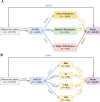The role of insulin resistance in the longitudinal progression from NAFLD to cardiovascular-kidney-metabolic disease
- PMID: 41094544
- PMCID: PMC12522269
- DOI: 10.1186/s12933-025-02953-9
The role of insulin resistance in the longitudinal progression from NAFLD to cardiovascular-kidney-metabolic disease
Abstract
Background and objective: This study aimed to elucidate the role of insulin resistance in the progression from non-alcoholic fatty liver disease (NAFLD) to cardiovascular-kidney-metabolic (CKM) diseases, and to explore the potential influence of lifestyle factors.
Methods: This study included participants free of NAFLD and CKM diseases from the UK Biobank. Insulin resistance was assessed using the TyG index. CKM diseases include ischemic stroke (IS), ischemic heart disease (IHD), type 2 diabetes (T2D), and chronic kidney disease (CKD). Markov multi-state models were used to assess the associations between the TyG index and disease transitions.
Results: Among 377,757 participants (median age 57 years), 4949 developed NAFLD over a median follow-up of 13.6 years. Of these, 12.65% progressed to T2D, 9.11% to IHD, 8.63% to CKD, and 4.61% to IS. Elevated TyG levels significantly accelerated transitions from NAFLD to first-onset CKM disease (HR = 1.25, 95% CI 1.05-1.49), double CKM disease (HR = 1.46, 95% CI 1.19-1.80), and triple CKM disease (HR = 1.81, 95% CI 1.28-2.55). Similar progression risk increases were observed for individual CKM components: T2D (HR = 1.41, 95% CI 1.11-1.78), CKD (HR = 1.37, 95% CI 1.08-1.75), and IS (HR = 1.70, 95% CI 1.27-2.27). A J-shaped dose-response relationship was identified. Transitions risk remained pronounced among individuals with healthy sleep and regular physical activity.
Conclusions: Insulin resistance independently accelerated the progression from NAFLD to CKM diseases, particularly ischemic stroke. Healthy sleep and regular physical activity failed to offset this detrimental impact.
Keywords: Cardiovascular-kidney-metabolic disease; NAFLD; TyG.
© 2025. The Author(s).
Conflict of interest statement
Declarations. Ethics approval and consent to participate: This study was conducted using data from the UK Biobank under application number 540121. Ethical approval was obtained from the North West Multi-Centre Research Ethics Committee. Consent for publication: Not applicable. Competing interests: The authors declare that they have no competing interests.
Figures
References
-
- Ndumele CE, Neeland IJ, Tuttle KR, Chow SL, Mathew RO, Khan SS, et al. A synopsis of the evidence for the science and clinical management of cardiovascular-kidney-metabolic (CKM) syndrome: a scientific statement from the American Heart Association. Circulation. 2023;148(20):1636–64. - PubMed
-
- Brunt EM, Wong VW, Nobili V, Day CP, Sookoian S, Maher JJ, et al. Nonalcoholic fatty liver disease. Nat Rev Dis Primers. 2015;1(1):15080. - PubMed
-
- Powell EE, Wong VW, Rinella M. Non-alcoholic fatty liver disease. Lancet. 2021;397(10290):2212–24. - PubMed
MeSH terms
Substances
Grants and funding
LinkOut - more resources
Full Text Sources
Medical
Miscellaneous



